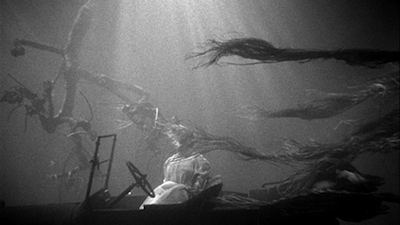 One of the greatest of all American directors only made one film in his career. Charles Laughton made “The Night of the Hunter” in 1955 after a long and reputable career as an actor, only to see his film fail financially and be critically misunderstood. Laughton died seven years later, but today his film is seen as a true cinematic achievement.
One of the greatest of all American directors only made one film in his career. Charles Laughton made “The Night of the Hunter” in 1955 after a long and reputable career as an actor, only to see his film fail financially and be critically misunderstood. Laughton died seven years later, but today his film is seen as a true cinematic achievement.
It’s story is not completely unique, but it is a fine example of a film that bends genres, that escapes confines of time and reality without distancing itself from something relatable and that endures in its quality and impact.
Robert Mitchum plays the film’s iconic villain, the “preacher” Harry Powell. Powell claims to be a man of God, walking around with the words “love” and “hate” tattooed on his fingers to illustrate the Lord’s way of governing mankind. When he meets Ben Harper (Peter Graves) in prison and learns that Ben hid $10,000 somewhere on his property, he believes it to be a message from God.
But the secret location of the money is hidden with Ben’s two children, John and Pearl. They’ve pledged an oath of loyalty to their now executed father to protect one another and never reveal the location of the money to anyone. When Powell tracks down the family and marries their widowed mother Willa (Shelley Winters), “The Night of the Hunter” becomes a suspenseful tale of faith and trust.
It’s a brilliantly conceived thriller with a minimal concept. One party is loved and trusted by everyone else, and the other is uncertain with no one who will listen or believe. This was hardly a new concept and far from the last of its kind. But “The Night of the Hunter” models Roger Ebert’s adage that a film is not what it is about but how it is about it.
Laughton’s style is breathtaking. Stanley Cortez’s photography, the same behind Orson Welles’ visionary “The Magnificent Ambersons,” is some of the best black and white cinematography put to film. And Laughton always evokes meaning in this beauty. One of the most memorable sequences is the moment before Powell murders his wife. Their bedroom seems to be inside a staggering and shadowy Gothic arch. Powell’s movements around the room are nearly balletic as though prepared to do God’s necessary dirty work. And it is then followed by one of the most hauntingly beautiful shots I’ve ever seen: the underwater tracking shot moving from just a glimpse of seaweed drifting in the current to Willa’s shimmering hair floating elegantly in a car at the bottom of the lake.
The elegance and tranquility of all of Laughton’s film making is what makes the film such a masterpiece. The editing graces all the touches of Walter Schumann’s score, transitioning from the more peaceful moments to intense ones wonderfully. He achieves in Mitchum’s performance a tone of soothing dominance, a character so hauntingly booming and commanding without ever appearing bombastic or over the top. Like Harry Powell, this is a film of many ranges.
It even continues to develop where a lesser film would opt for an action filled chase for an ending. The children escape from the preacher, only to have him follow in a montage perfected without drastic camera movements or overtly “scary” chords. The image of a lone horseman riding on the horizon is yet another remarkable story telling device coupled with Laughton’s dedication to the film’s lush landscapes.
They come across an aging woman caring for orphans like themselves. She’s played by the silent film star of several D.W. Griffith favorites, Lillian Gish, bringing to the film an added complexity of the struggle of humanity and survival. She observes an owl plucking a rabbit from the ground and notes, “It’s a hard world for little things.” Such symbolism is a lovely departure from horror thrillers of the same story.
“The Night of the Hunter” is a pitch perfect film. I’ve heard it described as the best film of all time. However, its legacy lies not in its influence or cultural significance but rather its sheer quality and dreamlike immersion. Few films can stir up this sort of terror and eloquence. It’s tempting to want more “meaning” from the film or perhaps something more to have earned a spot in the canon of great movies, but not even Harry Powell would have a love/hate relationship with this film.

